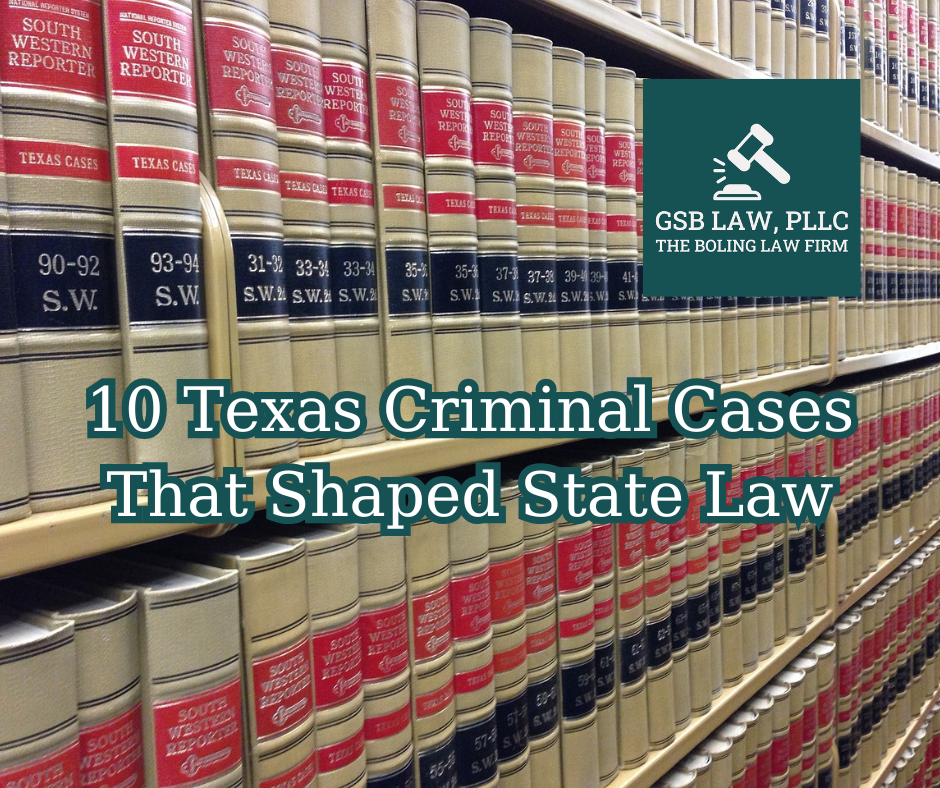
Texas has a long history of influential criminal cases that have significantly shaped the state’s legal landscape. These cases have played a crucial role in evolving legal interpretations, setting precedents, and impacting how defense strategies are developed in Texas courts. Below are ten landmark criminal cases that have had a profound influence on Texas law. These are the top 10 most influential Texas criminal cases.
The Importance of Landmark Cases in Texas
Landmark cases serve as more than just notable historical moments; they are the foundation for how laws are interpreted and applied. These cases influence the rights of individuals, set guidelines for law enforcement, and shape the defense strategies that attorneys use in courtrooms across the state. The following cases are a snapshot of how Texas law has evolved through critical decisions.
You Might Also Like:
1. Miranda v. Arizona (1966) – Bringing Miranda Rights to Texas
Although Miranda v. Arizona is a federal case, its impact has been felt strongly in Texas. In 1966, the U.S. Supreme Court ruled that suspects must be informed of their rights to remain silent and to have an attorney present during questioning. This decision established the now-famous “Miranda Warning” that must be given to individuals upon arrest.
Impact on Texas Law
The Miranda ruling changed how law enforcement in Texas conducts interrogations. It also became a cornerstone for defense attorneys challenging the admissibility of confessions, making the protection of defendants’ rights a crucial aspect of the criminal justice process.
2. Texas v. White (1869) – Secession and Federal Authority
In the aftermath of the Civil War, Texas v. White addressed whether Texas had legally seceded from the Union and if bonds issued during the Confederacy were valid. The U.S. Supreme Court ruled that Texas, like all other states, could not secede unilaterally.
Influence on Texas’ Legal Framework
This decision emphasized the principle of federal supremacy, shaping Texas’s legal relationship with the federal government. Issues of state versus federal jurisdiction, especially in criminal cases, continue to be influenced by this precedent.
3. Powell v. Texas (1968) – Defining Public Intoxication
Powell v. Texas involved a man convicted for public intoxication, raising questions about whether alcoholism should be considered a disease, thus exempting individuals from criminal punishment for related offenses. The U.S. Supreme Court ultimately upheld the conviction.
Implications for Criminal Defense
This case reinforced Texas’s right to criminalize public intoxication, influencing how courts handle cases involving substance abuse. The ruling continues to affect the defense strategies used for clients with addiction-related offenses.
4. Texas v. Johnson (1989) – Free Speech and Flag Burning
In 1989, the Texas v. Johnson case made national headlines when Gregory Lee Johnson was convicted for burning an American flag in protest. Texas law at the time prohibited flag desecration, leading to Johnson’s conviction.
Impact on First Amendment Rights
The U.S. Supreme Court overturned the conviction, ruling that flag burning constituted symbolic speech protected by the First Amendment. This decision underscored the strength of free speech rights in Texas and highlighted the limitations on state power to restrict expression.
5. Ex parte McJunkins (1944) – Questioning Eyewitness Testimony
In the case of Ex parte McJunkins, a wrongful conviction based on flawed eyewitness testimony raised serious concerns about the reliability of such evidence. This case was a turning point in how Texas courts view the credibility of eyewitness accounts.
Changes to Evidence Standards
As a result, Texas began to require more stringent guidelines for the use of eyewitness testimony, making corroborative evidence increasingly important in securing convictions.
6. Penry v. Lynaugh (1989) – Mental Health in Capital Punishment
Penry v. Lynaugh focused on whether executing mentally impaired individuals violated the Eighth Amendment’s ban on cruel and unusual punishment. This case had a direct impact on the treatment of mental health in Texas capital cases.
Influence on Death Penalty Cases
The U.S. Supreme Court’s decision led Texas to reconsider how mental impairment is evaluated in death penalty cases, eventually leading to more comprehensive standards regarding mental health and sentencing.
7. Lawrence v. Texas (2003) – Privacy and Consensual Adult Behavior
Lawrence v. Texas was a landmark case that challenged a Texas law criminalizing certain private consensual acts between same-sex adults. This case reached the U.S. Supreme Court and became a pivotal moment for privacy rights in the state.
Shaping Texas Criminal Law
The Supreme Court’s decision struck down the Texas law, reinforcing the right to privacy and decriminalizing consensual behavior among adults. This case reshaped Texas’s approach to privacy and personal freedoms.
8. Ruiz v. Estelle (1980) – Overhauling Texas Prisons
Ruiz v. Estelle was a class-action lawsuit that exposed the poor conditions in Texas prisons, including overcrowding, inadequate medical care, and unsafe living conditions. The ruling had a profound impact on the state’s correctional system.
Lasting Effects on Inmate Rights
The court’s decision mandated significant reforms in Texas prisons, leading to improved living standards, medical care, and greater oversight. These changes have had a lasting effect on how Texas manages its correctional facilities and the rights of inmates.
9. Salinas v. Texas (2013) – The Limits of the Right to Remain Silent
In Salinas v. Texas, the U.S. Supreme Court addressed whether a suspect’s silence during police questioning before being read their Miranda rights could be used against them in court. The ruling had significant implications for self-incrimination laws.
Impact on Texas Law
The decision allowed Texas prosecutors to use pre-Miranda silence as evidence, emphasizing the need for suspects to invoke their right to remain silent explicitly. This case remains a critical reference point for defense strategies involving self-incrimination.
10. Ex parte Thompson (2014) – Privacy and Public Photography
The case of Ex parte Thompson involved the legality of “improper photography” without consent in public spaces. The Texas Court of Criminal Appeals ruled that the statute was unconstitutional, citing First Amendment protections.
Shaping Privacy Laws in Texas
This ruling clarified the boundaries of free speech and privacy, reinforcing the protection of public photography under the First Amendment. It also influenced how Texas handles privacy issues in a digital age, balancing the rights of individuals with freedom of expression.
Conclusion
These ten cases are more than just legal milestones; they are the backbone of Texas’s evolving criminal justice system. They highlight the state’s ongoing dialogue between individual rights, state authority, and federal oversight. For legal professionals and residents alike, understanding these pivotal cases is essential to navigating the complexities of Texas law. We hope you enjoyed learning about influential Texas criminal cases.
By examining the outcomes and impacts of these cases, one gains a clearer understanding of how Texas courts interpret the law and how defense strategies are shaped. Whether it’s questions of privacy, free speech, or due process, these cases have left an indelible mark on Texas jurisprudence.Questions About Texas Criminal Law? Contact GSB Law, PLLC – The Boling Law Firm in Denton, Texas, Serving Denton, Collin, and Tarrant Counties
